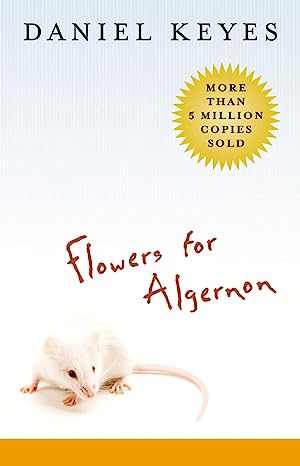TL;DR
Flowers for Algernon is a poignant tale of Charlie Gordon, a man with a low IQ who undergoes an experimental surgery to increase his intelligence, only to confront the bittersweet realities of life and loss as his intellect expands.
What is Flowers for Algernon about
'Flowers for Algernon' follows Charlie Gordon, a man with an intellectual disability, who is chosen for an experimental procedure aimed at enhancing his intelligence, previously successful with a lab mouse named Algernon. The story unfolds through Charlie's progress reports, revealing his transformation from a man with limited capabilities to one who surpasses the intellect of those around him. However, as his intelligence grows, he also experiences deeper emotional pain and the harsh realities of human relationships. The novel explores complex themes such as the ethics of medical experimentation, the treatment of the mentally disabled, and the transient nature of intelligence and happiness.
Flowers for Algernon 8 Key Takeaways
Charlie's initial condition and decision for surgery.
Charlie Gordon, who has an IQ of 68, is a kind-hearted man working at a bakery. He yearns to be smarter and is selected for an experimental surgery after proving his willingness to participate, marking the beginning of his transformation.
The surgery's success and Charlie's rising intelligence.
Post-surgery, Charlie's intelligence rapidly increases, allowing him to excel academically and socially, eventually surpassing his doctors, leading to a profound change in his self-perception and relationships.
Charlie’s relationship with Algernon and the foreshadowing of his fate.
As Charlie develops a bond with Algernon, the mouse that underwent the same procedure, he begins to notice Algernon's decline, foreshadowing the potential consequences of his own intelligence enhancement.
The peak of Charlie's intelligence and the complexities of human relationships.
Charlie's new-found intellect enables him to engage deeply with the world, but it also isolates him from those he once knew, highlighting the emotional complexities that accompany intelligence.
Algernon's deterioration and Charlie's realization of the experiment's risks.
When Algernon begins to regress, Charlie is forced to confront the reality that his own changes may not be permanent, leading to feelings of fear and uncertainty about his fate.
Charlie's decline and emotional turmoil.
As Charlie's intelligence begins to fade, he experiences a profound sense of loss, grappling with the fleeting nature of intellect and the heartache that accompanies his return to a lower cognitive state.
The emotional resolution and acceptance of his identity.
In the end, Charlie, now back to his initial state, reflects on his experiences, accepting the reality of his life while still holding onto the memories of his brief journey into genius.
The final poignant note and Charlie's legacy.
The story concludes with Charlie's acknowledgment of the lessons learned and his plea for understanding and compassion towards those who live with disabilities.
Top Flowers for Algernon Quotes
- "I am not a monster. I am a man, a human being, with feelings and thoughts that deserve recognition."
- "The more I learn, the more I realize how much I don't know."
- "I wish I could be as smart as I used to be, but I can't forget the things I've learned."
Who should read Flowers for Algernon?
'Flowers for Algernon' is ideal for readers interested in thought-provoking literary fiction that challenges societal norms regarding intelligence and disability. Those seeking emotional depth and ethical dilemmas in storytelling will find this book both enlightening and moving.
Flowers for Algernon Best Reviews
- "A powerful exploration of the human condition, 'Flowers for Algernon' delves into the complexities of intelligence and the essence of what it means to be human." - The New York Times
- "Keyes masterfully crafts a moving narrative that resonates deeply, making readers ponder the ethical implications of scientific advancements." - The Guardian
People also liked these summaries
Flowers for Algernon FAQs
What themes are explored in Flowers for Algernon?
The novel explores themes of intelligence, ethics of medical experimentation, the nature of happiness, and the societal treatment of the mentally disabled, prompting readers to reflect on these significant issues.
Is Flowers for Algernon suitable for young readers?
Due to its explicit language, mature themes, and emotional depth, 'Flowers for Algernon' may not be suitable for younger audiences; discretion is advised for readers under 16.
